- Home
- Annie Proulx
Close Range
Close Range Read online
ALSO BYANNIEPROULX
Heart Songs and Other Stories
Postcards
The Shipping News
Accordion Crimes
SCRIBNER
1230 Avenue of the Americas
New York, NY 10020
This book is a work of fiction. Names, characters, places, and incidents either are products of the author’s imagination or are used fictitiously. Any resemblance to actual events or locales or persons, living or dead, is entirely coincidental.
Copyright © 1999 by Dead Line, Ltd.
All rights reserved, including the right of reproduction in whole or in part in any form.
SCRIBNERand design are trademarks of Macmillan Library Reference USA, Inc., used under license by Simon & Schuster, the publisher of this work.
Library of Congress Cataloging-in-Publication Data
Proulx, Annie.
Close range : Wyoming stories / Annie Proulx.
p. cm.
Contents: The half-skinned steer—The mud below—55 miles to the gas pump—The bunchgrass edge of the world—A lonely coast—Job history—Pair a spurs—People in Hell just want a drink of water—The governors of Wyoming—The blood bay—Brokeback Mountain.
1. Wyoming—Social life and customs—Fiction.
2. Frontier and pioneer life—Wyoming—Fiction.
3. Ranch life—Wyoming—Fiction. I. Title.
PS3566.R697C58 1999
813'.54—dc21 98-56066
CIP
ISBN-13: 978-1-4165-8889-4
ISBN-10: 1-4165-8889-2
“Brokeback Mountain,” “The Mud Below,” “The Blood Bay,” and “The Bunchgrass Edge of the World” originally appeared inThe New Yorker ; “The Half-Skinned Steer” appeared inThe Atlantic Monthly ; “People in Hell Just Want a Drink of Water” appeared in GQ.
Visit us on the World Wide Web:
http://www.SimonSays.com
These stories are for my children
Muffy
Jon
Gillis
Morgan
Acknowledgments
The encouragement and support of many people saw me through the writing of these stories and I am grateful to them. Special thanks to my editor, Nan Graham, for advice and counsel, and for her interest in reviving for this collection the brilliant Scribner tradition of illustrated fiction. Thanks to my agent, Liz Darhansoff, and the staff of Darhansoff and Verrill for every kind of help. I’m grateful to my old friend Tom Watkin for putting up with long discussions of minute facets of characters’ lives. My thanks to Elizabeth Guheen, Sharon Dynak, and Keith Troll of Ucross Foundation for a hundred kindnesses, and to John and Barbara Campbell of the Foundation’s Big Red Ranch for their generous hospitality, information and gripping plane rides with John over the landscape. It was both a pleasure and an education working withThe New Yorker fiction editor Bill Buford in adapting several of these stories for publication in that magazine. Thanks to Paul Etchepare for talk about sixties sheep camps, and to musician and songwriter Skip Gorman who persuaded me to go to the Cowboy Poetry Gathering in Elko, Nevada, where I met Texas songwriter and singer Tom Russell. I thank Tom Russell for his kind permission to use as story title part of the title of his powerful song “The Sky Above, the Mud Below.” Thanks to Buzzy Malli, proprietor of the Arvada Bar, who asked for a story set in that town and got it—“—The Blood Bay”—a Wyoming twist on the folktale “The Calf That Ate the Traveler,” known in many stock-raising cultures. Another story, “The Half-Skinned Steer,” which was first published inThe Atlantic Monthly, is based on an old Icelandic folktale, “Porgeir’s Bull.” I am also an aficionado of local histories and for years have collected memoirs and accounts of regional lives and events in many parts of North America. I found I could not forget a few disturbing paragraphs in Helena Thomas Rubottom’s 1987 fine regional Wyoming history,Red Walls and Homesteads (edited and published by Margaret Brock Hansen) and that real-life anecdote was the takeoff point for the story “People in Hell Just Want a Drink of Water.”
The lines of poetry quoted in “The Governors of Wyoming” are by the seventeenth-century poet Edward Taylor from the 1960 Yale University PressThe Poems of Edward Taylor edited by Donald E. Stanford.
“The Half-Skinned Steer” set this collection in motion when the Nature Conservancy asked me to contribute something to a proposed collection of short fiction (Off the Beaten Path,Farrar, Straus & Giroux, 1998). The stories were to be inspired by a visit to one or more Nature Conservancy preserves. I agreed, if I could visit a Wyoming site. That was the 10,000-acre Ten Sleep Preserve on the south slope of the Big Horns where I spent several days. My grateful thanks to Phil Shephard and Anne Humphrey for their time and help. I found working again in the short story form so interesting and challenging (short stories are very difficult for me) that the idea of a collection of short fiction set in Wyoming seized me entirely. I am fortunate in having a publisher who allowed me this side trip.
The epigraph “Reality’s never been of much use out here” comes from an anonymous rancher quoted in Jack Hitts’s “Where the Deer and the Zillionaires Play,”Outside, October 1997. The elements of unreality, the fantastic and improbable, color all of these stories as they color real life. In Wyoming not the least fantastic situation is the determination to make a living ranching in this tough and unforgiving place.
Most of all, deepest thanks to my children for putting up with my strangled, work-driven ways.
Contents
The Half Skinned Steer
The Mud Below
Job History
The Blood Bay
People in Hell Just Want a Drink of Water
The Bunchgrass Edge of the World
Pair a Spurs
A Lonely Coast
The Governors of Wyoming
55 Miles to the Gas Pump
Brokeback Mountain
“Reality’s never been of much use out here.”
—Retired Wyoming rancher
Close Range
The Half-Skinned Steer
IN THE LONG UNFURLING OF HIS LIFE, FROM TIGHT-WOUNDkid hustler in a wool suit riding the train out of Cheyenne to geriatric limper in this spooled-out year, Mero had kicked down thoughts of the place where he began, a so-called ranch on strange ground at the south hinge of the Big Horns. He’d got himself out of there in 1936, had gone to a war and come back, married and married again (and again), made money in boilers and air-duct cleaning and smart investments, retired, got into local politics and out again without scandal, never circled back to see the old man and Rollo bankrupt and ruined because he knew they were.
They called it a ranch and it had been, but one day the old man said it was impossible to run cows in such tough country where they fell off cliffs, disappeared into sinkholes, gave up large numbers of calves to marauding lions, where hay couldn’t grow but leafy spurge and Canada thistle throve, and the wind packed enough sand to scour windshields opaque. The old man wangled a job delivering mail, but looked guilty fumbling bills into his neighbors’ mailboxes.
Mero and Rollo saw the mail route as a defection from the work of the ranch, work that fell on them. The breeding herd was down to eighty-two and a cow wasn’t worth more than fifteen dollars, but they kept mending fence, whittling ears and scorching hides, hauling cows out of mudholes and hunting lions in the hope that sooner or later the old man would move to Ten Sleep with his woman and his bottle and they could, as had their grandmother Olive when Jacob Corn disappointed her, pull the place taut. That bird didn’t fly and Mero wound up sixty years later as an octogenarian vegetarian widower pumping an Exercycle in the living room of a colonial house in Woolfoot, Massachusetts.
One of those damp mornings the nail-driving telephone voice of a woman said she was
Louise, Tick’s wife, and summoned him back to Wyoming. He didn’t know who she was, who Tick was, until she said, Tick Corn, your brother Rollo’s son, and that Rollo had passed on, killed by a waspy emu though prostate cancer was waiting its chance. Yes, she said, you bet Rollo still owned the ranch. Half of it anyway. Me and Tick, she said, we been pretty much running it the last ten years.
An emu? Did he hear right?
Yes, she said. Well, of course you didn’t know. You heard of Down Under Wyoming?
He had not. And thought, what kind of name was Tick? He recalled the bloated grey insects pulled off the dogs. This tick probably thought he was going to get the whole damn ranch and bloat up on it. He said, what the hell was this about an emu? Were they all crazy out there?
That’s what the ranch was now, she said, Down Under Wyoming. Rollo’d sold the place way back when to the Girl Scouts, but one of the girls was dragged off by a lion and the G.S.A. sold out to the Banner ranch next door who ran cattle on it for a few years, then unloaded it on a rich Australian businessman who started Down Under Wyoming but it was too much long-distance work and he’d had bad luck with his manager, a feller from Idaho with a pawnshop rodeo buckle, so he’d looked up Rollo and offered to swap him a half-interest if he’d run the place. That was back in 1978. The place had done real well. Course we’re not open now, she said, it’s winter and there’s no tourists. Poor Rollo was helping Tick move the emus to another building when one of them turned on a dime and come right for him with its big razor claws. Emus is bad for claws.
I know, he said. He watched the nature programs on television.
She shouted as though the telephone lines were down all across the country, Tick got your number off the computer. Rollo always said he was going to get in touch. He wanted you to see how things turned out. He tried to fight it off with his cane but it laid him open from belly to breakfast.
Maybe, he thought, things hadn’t finished turning out. Impatient with this game he said he would be at the funeral. No point talking about flights and meeting him at the airport, he told her, he didn’t fly, a bad experience years ago with hail, the plane had looked like a waffle iron when it landed. He intended to drive. Of course he knew how far it was. Had a damn fine car, Cadillac, always drove Cadillacs, Gislaved tires, interstate highways, excellent driver, never had an accident in his life knock on wood, four days, he would be there by Saturday afternoon. He heard the amazement in her voice, knew she was plotting his age, figuring he had to be eighty-three, a year or so older than Rollo, figuring he must be dotting around on a cane too, drooling the tiny days away, she was probably touching her own faded hair. He flexed his muscular arms, bent his knees, thought he could dodge an emu. He would see his brother dropped in a red Wyoming hole. That event could jerk him back; the dazzled rope of lightning against the cloud is not the downward bolt, but the compelled upstroke through the heated ether.
He had pulled away at the sudden point when it seemed the old man’s girlfriend—now he couldn’t remember her name—had jumped the track, Rollo goggling at her bloody bitten fingers, nails chewed to the quick, neck veins like wires, the outer forearms shaded with hairs, and the cigarette glowing, smoke curling up, making her wink her bulged mustang eyes, a teller of tales of hard deeds and mayhem. The old man’s hair was falling out, Mero was twenty-three and Rollo twenty and she played them all like a deck of cards. If you admired horses you’d go for her with her arched neck and horsy buttocks, so high and haunchy you’d want to clap her on the rear. The wind bellowed around the house, driving crystals of snow through the cracks of the warped log door and all of them in the kitchen seemed charged with some intensity of purpose. She’d balanced that broad butt on the edge of the dog food chest, looking at the old man and Rollo, now and then rolling her glossy eyes over at Mero, square teeth nipping a rim of nail, sucking the welling blood, drawing on her cigarette.
The old man drank his Everclear stirred with a peeled willow stick for the bitter taste. The image of him came sharp in Mero’s mind as he stood at the hall closet contemplating his hats; should he bring one for the funeral? The old man had had the damnedest curl to his hat brim, a tight roll on the right where his doffing or donning hand gripped it and a wavering downslope on the left like a shed roof. You could recognize him two miles away. He wore it at the table listening to the woman’s stories about Tin Head, steadily emptying his glass until he was nine-times-nine drunk, his gangstery face loosening, the crushed rodeo nose and scar-crossed eyebrows, the stub ear dissolving as he drank. Now he must be dead fifty years or more, buried in the mailman sweater.
The girlfriend started a story, yeah, there was this guy named Tin Head down around Dubois when my dad was a kid. Had a little ranch, some horses, cows, kids, a wife. But there was something funny about him. He had a metal plate in his head from falling down some cement steps.
Plenty of guys has them, said Rollo in a challenging way.
She shook her head. Not like his. His was made out of galvy and it eat at his brain.
The old man held up the bottle of Everclear, raised his eyebrows at her: Well, darlin?
She nodded, took the glass from him and knocked it back in one swallow. Oh, that’s not gonna slowme down, she said.
Mero expected her to neigh.
So what then, said Rollo, picking at the horse shit under his boot heel. What about Tin Head and his galvanized skull-plate?
I heard it this way, she said. She held out her glass for another shot of Everclear and the old man poured it and she went on.
Mero had thrashed all that ancient night, dreamed of horse breeding or hoarse breathing, whether the act of sex or bloody, cut-throat gasps he didn’t know. The next morning he woke up drenched in stinking sweat, looked at the ceiling and said aloud, it could go on like this for some time. He meant cows and weather as much as anything, and what might be his chances two or three states over in any direction. In Woolfoot, riding the Exercycle, he thought the truth was somewhat different: he’d wanted a woman of his own without scrounging the old man’s leftovers.
What he wanted to know now, tires spanking the tar-filled road cracks and potholes, funeral homburg sliding on the backseat, was if Rollo had got the girlfriend away from the old man, thrown a saddle on her and ridden off into the sunset?
The interstate, crippled by orange pylons, forced traffic into single lanes, broke his expectation of making good time. His Cadillac, boxed between semis with hissing air brakes, snuffled huge rear tires, framed a looming Peterbilt in the back window. His thoughts clogged as if a comb working through his mind had stuck against a snarl. When the traffic eased and he tried to cover some ground the highway patrol pulled him over. The cop, a pimpled, mustached specimen with mismatched eyes, asked his name, where he was going. For the minute he couldn’t think what he was doing there. The cop’s tongue dapped at the scraggy mustache while he scribbled.
Funeral, he said suddenly. Going to my brother’s funeral.
Well you take it easy, Gramps, or they’ll be doing one for you.
You’re a little polecat, aren’t you, he said, staring at the ticket, at the pathetic handwriting, but the mustache was a mile gone, peeling through the traffic as Mero had peeled out of the ranch road that long time ago, squinting through the abraded windshield. He might have made a more graceful exit but urgency had struck him as a blow on the humerus sends a ringing jolt up the arm. He believed it was the horse-haunched woman leaning against the chest and Rollo fixed on her, the old man swilling Everclear and not noticing or, if noticing, not caring, that had worked in him like a key in an ignition. She had long grey-streaked braids, Rollo could use them for reins.
Yah, she said, in her low and convincing liar’s voice. I’ll tell you, on Tin Head’s ranch things went wrong. Chickens changed color overnight, calves was born with three legs, his kids was piebald and his wife always crying for blue dishes. Tin Head never finished nothing he started, quit halfway through a job every time. Even his pants was half-buttoned so h
is wienie hung out. He was a mess with the galvy plate eating at his brain and his ranch and his family was a mess. But, she said. They had to eat, didn’t they, just like anybody else?

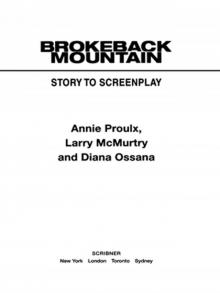 Brokeback Mountain
Brokeback Mountain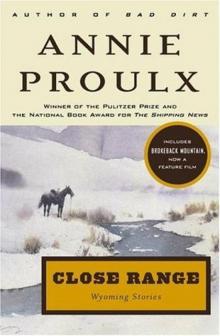 Close Range
Close Range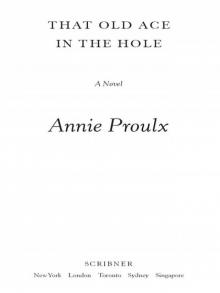 That Old Ace in the Hole
That Old Ace in the Hole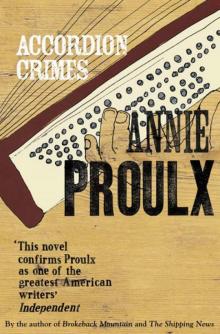 Accordion Crimes
Accordion Crimes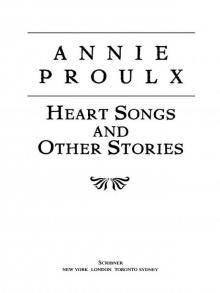 Heart Songs and Other Stories
Heart Songs and Other Stories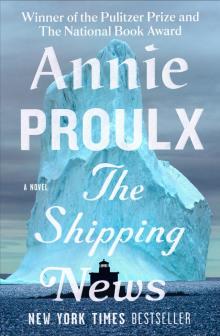 The Shipping News
The Shipping News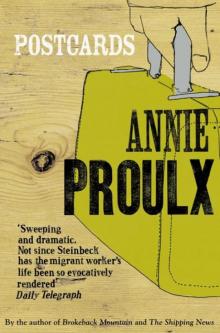 Postcards
Postcards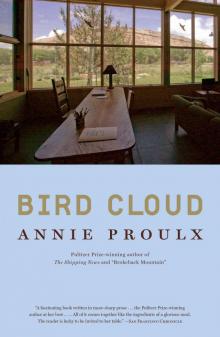 Bird Cloud
Bird Cloud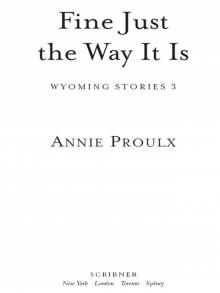 Fine Just the Way It Is
Fine Just the Way It Is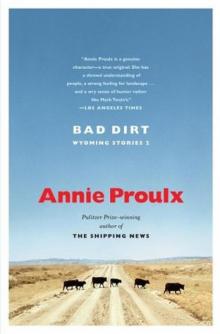 Bad Dirt
Bad Dirt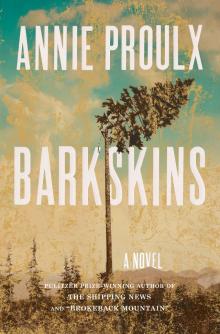 Barkskins
Barkskins BrokebackMountain
BrokebackMountain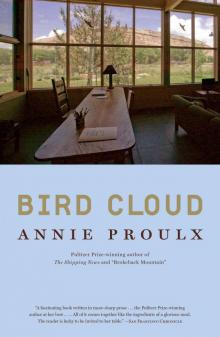 Bird Cloud: A Memoir of Place
Bird Cloud: A Memoir of Place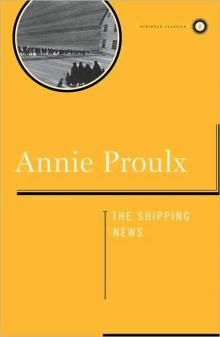 Shipping News_A Novel
Shipping News_A Novel